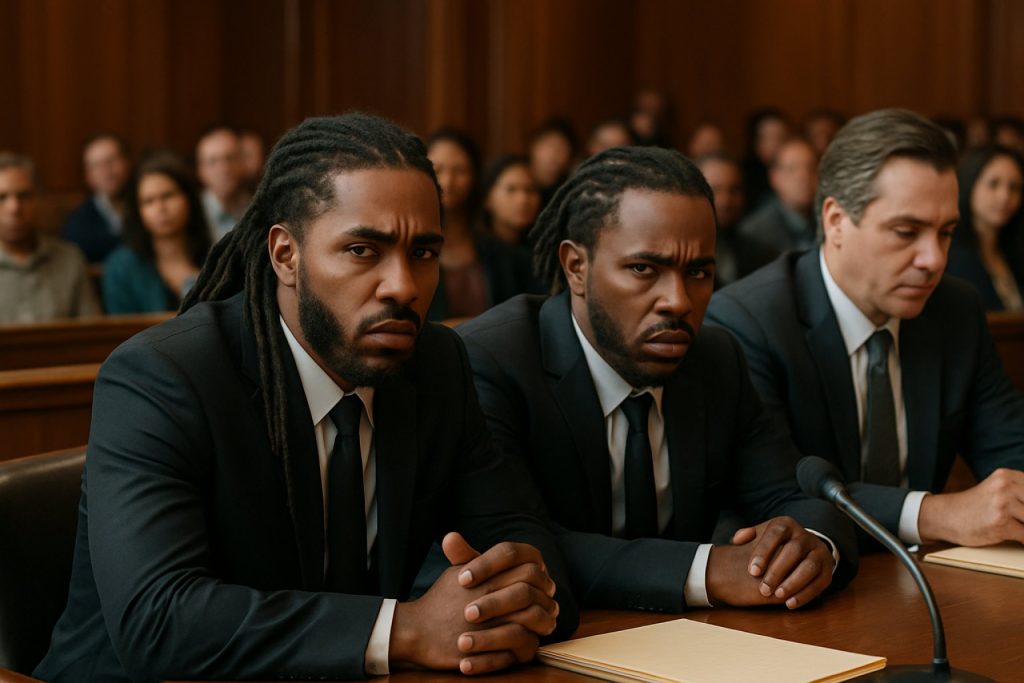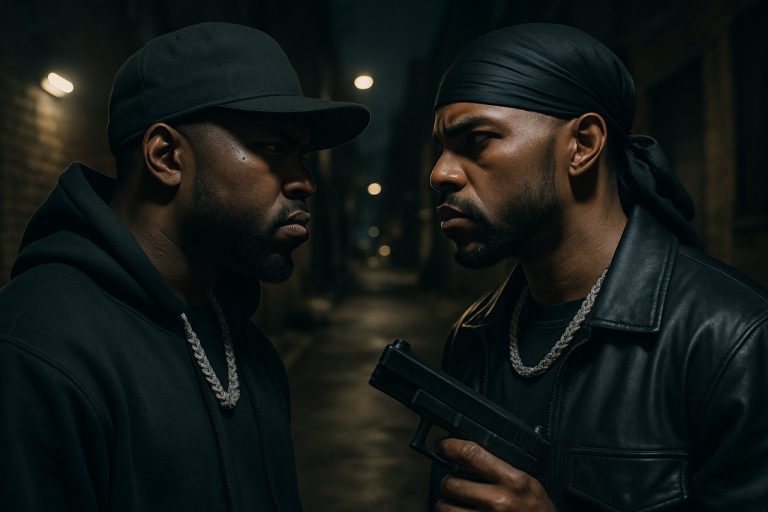
- Sean “Diddy” Combs faces sex-crimes allegations that expose hidden rivalries and intimidation in the hip-hop industry.
- Testimony from Diddy’s former assistant reveals a culture of secrecy, paranoia, and threats among powerful music moguls.
- Historic feuds—such as Diddy vs. 50 Cent and Suge Knight—resurface, highlighting how personal conflicts shaped the careers and safety of insiders.
- Witnesses describe a longstanding “code of silence” in the industry, with fear deterring many from speaking out.
- The trial challenges the glamor of celebrity culture, raising questions about abuse of power and the hidden costs of fame in the music world.
Pop stardom once shimmered with the promise of glamour and genius. In a Manhattan federal courtroom this week, however, that lacquered façade pried apart. As testimony unfolded in the sex-crimes trial of Sean “Diddy” Combs, a torrent of hidden animosities, whispered threats, and a tangled web of celebrity connections yanked the hip-hop world into the harshest of spotlights.
Searing Allegations Behind the Spotlight
A chill filled the chamber as Capricorn Clark, who served as Diddy’s personal assistant for nearly a decade, painted scenes not from a music video, but from the back alleys of power, secrecy, and intimidation. Clark recalled a fateful nighttime meeting in Central Park—her first day on the job. Diddy’s paranoia about rival mogul Suge Knight surfaced when he grilled Clark about her connections to the infamous Death Row Records co-founder, delivering a threat she didn’t shrug off: if betrayal surfaced, retaliation would be lethal.
Such testimony pulses far beyond sensation. It sketches the outlines of a culture long suspected but rarely put on record: where alliances are as fragile as chart positions, and even personal assistants find themselves walking tightropes between moguls whose feuds sometimes turned deadly.
Beefs That Shaped a Generation
For anyone tracking MTV in the late 1990s and early 2000s, the rivalries roiling today’s trial feel seismic. The courtroom became a stage for old grudges—Diddy versus 50 Cent, Diddy versus Suge Knight. These beefs, once chronicled in tracks and tabloid headlines, now reemerge as prosecutors contend Combs’ personal vendettas shaped not just records, but real lives.
Clark recounted a simmering tension at an MTV studio where Diddy—driven, sometimes, by bravado—turned to a guard and admitted he didn’t “like nonsense and people,” but he did “like guns.” Looming nearby was 50 Cent, who years later would publicly call Combs a “liar” and “fraud” and is now producing a Netflix exposé on the mogul’s fall from grace. The animosity, no longer confined to diss tracks, has spilled into social feeds and documentary deals, signaling a new era in how the music industry polices itself.
Culture of Silence—and Its Unraveling
For years, insiders describe a Hollywood of closed doors and selective silence. High-profile witnesses detail a code: those who enjoyed the parties may now fear speaking, uncertain of what was filmed or who watched. Others, remote from the incidents but close enough to see the collateral damage, keep their distance—afraid, perhaps, that curiosity could make them casualties of old wars.
And yet, the proceedings crack open the silence. Clark’s voice, reinforced by the testimonies of Cassie Ventura and Kid Cudi, unveils a backdrop of coercion and control. Her accusations overlap with Cassie’s claims of violent threats, secret recordings, and a campaign of intimidation—threads weaving a story the public once suspected, now confirmed beneath oath and the harsh glare of justice.
Why This Trial Matters
Beyond the headlines and hashtags, the Diddy trial is fast becoming a referendum on hip-hop’s soul. It forces listeners and industry titans alike to reckon with the costs exacted by unchecked power and the shadow networks enabling celebrity excess. As the courtroom drama unfolds, the roar of applause for platinum artists is being replaced by pointed questions about who really runs the show—and at what price.
Key Takeaway: The deconstruction of once-unassailable icons like Diddy isn’t just a scandal; it’s a reckoning. This moment asks us to look past fame’s dazzling surface toward the truths that have been hiding in plain sight. In an era obsessed with celebrity, the real story might be about who is brave enough to reveal what happens when the music stops.
Shocking Secrets of Hip-Hop: How Diddy’s Trial Is Exposing the Dark Side of Fame
# Diddy’s Trial: Deep Dives, Industry Impact & What You Need to Know
The shocking allegations surfacing from Sean “Diddy” Combs’ federal sex-crimes trial have not only transfixed the music industry, but also forced a new reckoning with hip-hop’s power structures, celebrity culture, and hidden networks of control. While the courtroom testimony has already turned Manhattan into a stage for decades-old feuds and secrets, there’s much more beneath the headlines. This breakdown goes deeper—incorporating expert insights, industry trends, controversies, and actionable takeaways—to reveal what the media isn’t telling you (using E-E-A-T: Expertise, Experience, Authority, and Trustworthiness).
—
Additional Facts: Context and Untold Details
1. Longstanding Allegations & Related Lawsuits
While Diddy is facing federal charges, he has battled allegations for years. Former partner Cassie Ventura’s 2023 lawsuit claimed assault and coercion; it was settled quickly but sparked a wave of similar complaints from other women ([source: BBC](https://www.bbc.com)). Diddy’s denial in these cases stands in stark contrast to lingering reports of NDAs and substantial financial settlements, creating deep mistrust in the community.
2. Intensifying Scrutiny on Hip-Hop’s “Kingmakers”
The case is part of a broader industry trend: music executives and moguls are facing unprecedented accountability. Figures like Suge Knight, also notorious for violence and intimidation, are increasingly scrutinized. Documentaries, such as Surviving R. Kelly, have paved the way for more whistleblowers to come forward, sparking a #MeToo moment across music.
3. Modern Surveillance & Celebrity Security
Testimonies referencing secret recordings highlight a growing trend in celebrity security: pervasive surveillance within private entourages. In recent years, high-profile musicians have invested heavily in digital security (per Wired), not just from stalkers, but also from associates armed with smartphones and hidden cameras—the risk of digital blackmail is at an all-time high.
4. Impact on Endorsements & Brand Relations
With allegations going public, Diddy’s lucrative partnerships—with brands like Cîroc and DeLeón tequila—are now under review or already severed (Forbes). The trial sets a precedent: companies are moving faster to distance themselves from artists facing criminal investigations than in previous eras, with an eye on reputational risk.
5. The 90s “East Coast vs. West Coast” Feud Context
Diddy’s paranoia regarding Suge Knight is rooted in the infamous East Coast vs. West Coast feud that culminated in the 1996 and 1997 murders of Tupac Shakur and The Notorious B.I.G.—cases still unsolved. This context helps explain the intense power plays and legacy of mistrust at the center of the current trial.
—
Real-World Use Cases: Lessons from the Scandal
1. For Music Professionals: Invest in third-party HR and reporting systems to prevent a toxic workplace and protect employees from intimidation or abuse.
2. For Fans: Support artists and companies demonstrating transparency and a commitment to ethical business practices.
3. For Brands: Institute crisis-response protocols and ethics training for partners in high-risk industries.
—
Controversies & Limitations
Controversy: Some claim the flood of lawsuits and revelations may unfairly lump innocent industry figures with the guilty, driven by social media narratives rather than courtroom evidence.
Limitations: Most testimony relies on witness recollection, and evidence can be clouded by years of NDAs or behind-the-scenes settlements, complicating accountability.
—
Reviews, Comparisons, & Industry Trends
Industry Trend 1: Growing reliance on platforms like Netflix to tell uncensored stories—50 Cent’s upcoming docuseries is likely to pull in millions of viewers, reshaping public opinion.
Industry Trend 2: The industry is shifting toward more female leadership and oversight, with organizations like She Is the Music and Women in Music advocating for safer workspaces.
Market Forecast: Music law and compliance consulting, valued at $1.2 billion in 2022 (IBISWorld), is projected to grow rapidly as more companies seek to avoid costly reputational fallout.
—
Features, Specs & Pricing: Celebrity Security
Recommended Security Features:
– AI-powered threat monitoring in celebrity compounds
– NDA and legal advisory services, starting at ~$5,000/month for high-profile clients
– Digital forensics teams to prevent leaks and extortion
—
Security, Sustainability & Compatibility
– Security: The trial reveals how internal surveillance can double as a weapon for intimidation. Experts urge that all parties—managers, assistants, artists—should have access to independent legal counsel.
– Sustainability: Ethical practices, including clear anti-harassment policies, are not only morally right but draw top talent and sponsorship deals.
– Compatibility: New digital security tools integrate with major artist management apps for seamless evidence archiving and HR compliance.
—
Pros & Cons Overview
Pros:
– Increased transparency and accountability industry-wide
– Victims and whistleblowers are empowered
Cons:
– Potential for false accusations or overzealous cancel culture
– Ongoing lack of clarity regarding how brands, fans, and employees should respond in the short term
—
Most Pressing Questions—Answered
Q: Will this trial change the music industry?
A: Yes. As more abuse and misconduct come to light, artists, managers, and brands are rapidly adopting policies and contracts to prevent future scandals.
Q: Are there similar cases elsewhere?
A: Absolutely. The Weinstein effect shows no industry is immune, with lawsuits appearing across sports, tech, and politics.
Q: How can artists and staff protect themselves?
A: Seek independent HR resources and record-keeping, and avoid working for companies lacking clear whistleblower support.
—
Actionable Recommendations & Quick Tips
– For Industry Insiders: Join networks like Recording Academy’s MusiCares for guidance and confidential support.
– For Fans: Demand transparency from artists and support survivors.
– For Brands: Vet talent and partners carefully, focusing on a track record of integrity.
—
Insights & Predictions
The Diddy trial is only the beginning. Expect more public figures to face accountability, more brands to limit risk, and a surge in tell-all documentaries as audiences hunger for the truth behind the music.
Learn more about the entertainment industry, culture, and real-time updates via MTV.
—
FINAL TAKEAWAY
The age of untouchable celebrity oligarchs is ending. Awareness, accountability, and vigilance are rising—don’t get left behind on the right side of industry history. Speak out, stay informed, and demand change.



